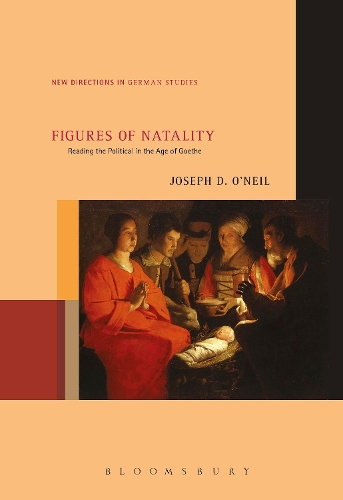
Figures of Natality: Reading the Political in the Age of Goethe
(Hardback)
Available Formats
Publishing Details
Figures of Natality: Reading the Political in the Age of Goethe
By (Author) Dr. Joseph D. ONeil
Bloomsbury Publishing PLC
Bloomsbury Academic USA
26th January 2017
United States
Classifications
Tertiary Education
Non Fiction
Literary studies: c 1800 to c 1900
830.9006
Physical Properties
Hardback
320
Width 140mm, Height 216mm
522g
Description
Figures of Natality reads metaphors and narratives of birth in the age of Goethe (1770-1832) as indicators of the new, the unexpected, and the revolutionary. Using Hannah Arendts concept of natality, Joseph ONeil argues that Lessing, Goethe, and Kleist see birth as challenging paradigms of Romanticism as well as of Enlightenment, resisting the assimilation of the political to economics, science, or morality. They choose instead to preserve the conflicts and tensions at the heart of social, political, and poetic revolutions. In a historical reading, these tensions evolve from the idea of revolution as Arendt reads it in British North America to the social and economic questions that shape the French Revolution, culminating in a consideration of the culture of the modern republic as such. Alongside this geopolitical evolution, the ways of representing the political change, too, moving from the new as revolutionary eruption to economic metaphors of birth. More pressing still is the question of revolutionary subjectivity and political agency, and Lessing, Goethe, and Kleist have an answer that is remarkably close to that of Walter Benjamin, as that secret index through which each past age is pointed toward redemption. Figures of Natality uncovers this index at the heart of scenes and products of birth in the age of Goethe.
Reviews
At the core of this project is the question of how political action is possible without relying on essentialism. We do not need to be reminded of current discussions to understand that this is a timely project. ONeil offers a sophisticated account of the concepts behind these debates which delivers to the reader both a panoramic display of political theory and a careful consideration of literary texts The study brings a number of discourses into relation (biology, selfhood, economic etc.), arguing that they all follow a shared model of autopoiesis (or its rupture) around 1800. Considering the metaphor of birth at the studys center, it is not surprising that the author aims to establish a connection between models of lifes origin and the political Ultimately, however, for ONeil the question is not only what happens in literature, but what we gain when engaging with it. ONeils work is driven by the desire to open spaces for contingency in action in a world that is increasingly defined by automatization and repetition. In opening these spaces, literature plays a prominent role as that which breaks with social and cognitive routines (21) ONeils engagement with Arendts concept of natality proves an impressively productive venue for, as the title states, Reading the Political in the Age of Goethe. It is also a powerful reminder that the end of politics might not deliver the best of possible worlds. * Christine Lehleiter, University of Toronto, Canada *
Joseph ONeils Figures of Natality offers an insightful and conceptually bold rethinking of the political as it is worked through in literary texts in the age of Goethe This task is both worthwhile and timely, and the readings it produces are genuinely novel and interesting. * German Studies Review *
O'Neil connects Hannah Arendts concept of natality as the birth of the new and Carl Schmitts understanding of the sovereign decision as a basis for social organization in order to explore the nature of the political. By focusing on natality, he can both use and challenge Arendts and Schmitts approaches, because natality points to the paradoxical conjoining of the reproductive and productive, or, in ONeils version, the economic and the political. In his reading of major texts from German literature spanning the decades around 1800 that embrace this conjoining, ONeil makes the deployment of a discourse and metaphors around birth fruitful for us today. * John H. Smith, Professor of German, University of California, Irvine, USA *
ONeils is a dynamic, ingeniously crafted tour de force, which, by virtue of its range and diversity, succeeds in generating a web of hitherto unnoticed contextualizations. Its appeal will not be restricted to specialists already attuned to the intricacies of post-foundational discourse. * Modern Language Review *
In Figures of Natality, ONeil has provided a fascinating and lucid reflection on inception within the political, and hence on the relationship of birth to the state in literature and in theory. Scholars of the Age of Goethe and political theorists alike will benefit from this study of spontaneity, will, and life processes as crucial to understanding the political across an arc of two centuries. Highly recommended! * Stefani Engelstein, Associate Professor of German, Duke University, USA, and author of Anxious Anatomy: The Conception of the Human in Literary and Naturalist Discourse (2008) and Sibling Action: The Genealogical Structure of Modernity (forthcoming 2017) *
Joseph ONeil provides an original and surprising insight into the poetics and politics of life around 1800. * Joseph Vogl, Professor of German Literature, Humboldt University of Berlin, Germany, and Permanent Visiting Professor, Princeton University, USA, as well as author of The Specter of Capital (2015) and The Ascendancy of Finance (2017). *
Author Bio
Joseph D. ONeil is Associate Professor in German Studies in the Department of Modern and Classical Languages, Literatures, and Cultures at the University of Kentucky, USA.
